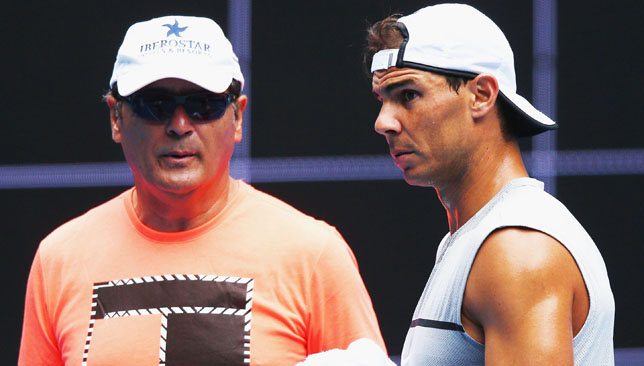
There is a story Toni Nadal likes to tell. When his nephew and student, Rafael Nadal, won the Spanish Championships when he was 11 years old, Toni wanted to make sure he never got too satisfied by what he had just achieved.
He called the Spanish Tennis Federation, got the list of the past 25 champions of that tournament and started listing the names to Rafa, many of which were unrecognizable.
“At the end, there were only like five names we knew out of the 25. I told him ‘this is the possibility that you have’,” recalls Toni.
“When Rafael won the first Roland Garros, I did the same thing. Before, I thought that Carlos Moya can win more than one Roland Garros, Juan Carlos Ferrero too. But at the end, they didn’t win more. And that’s what I told Rafael. It’s difficult to improve when you are completely satisfied with what you have achieved. We have to try to improve and be better every year, and even sometimes that’s not enough.”
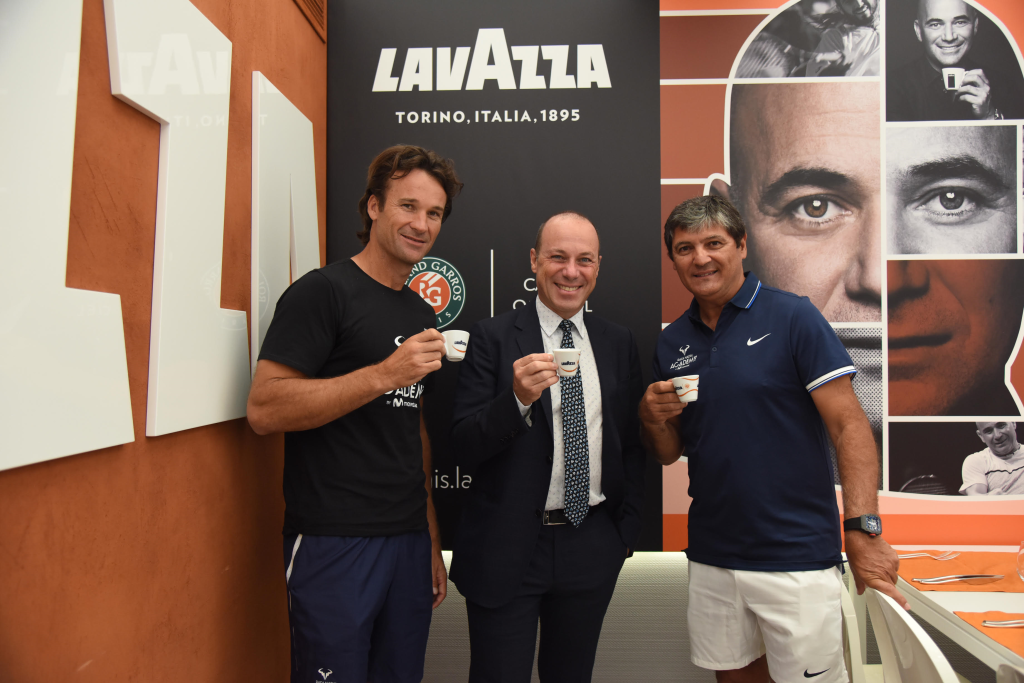
Rafa’s relationship with Toni as his life-long coach has been the cornerstone of the Spaniard’s career. Together, they’ve won 14 Grand Slam titles and smashed countless records.
This fortnight, it will be their last hurrah together at Roland Garros, as Toni will stop traveling with Rafa after the end of this season. Rafa is attempting to win a mythical 10th French Open crown, which would be the perfect parting gift for his uncle in Paris.
Surely this last outing with Rafa here in the French capital has a special feel to it, no?
“No, not at all. For me it’s not special,” Toni told reporters at the Lavazza Lounge at the VIP Village of Roland Garros.
“Maybe it could be special next year when I’m at home in Mallorca watching Rafael play on Philippe Chatrier, maybe that’s going to be special for me. Because maybe when I’m at home I can think ‘woah, last year I was in Paris’. I’m very happy to be here, and I’m very happy too when I’m at home.”
Much has been made of Rafa’s attempt to complete an unprecedented ‘La Decima’ at Roland Garros. He has tried to grab that 10th title in each of his last two appearances in Paris, but lost in the quarter-finals to Novak Djokovic in 2015, and withdrew due to a wrist injury before his third round last year.
The tennis world is waiting to see if Rafa can pull it off this fortnight, but for Toni, the number ‘10’ is “nothing special”.
“When we arrived here after winning the final against (Mariano) Puerta (in 2005), I thought ‘wow, this is so good, we have won Roland Garros’. A dream many players work hard to achieve and we have done it,” said the Mallorcan coach.
“I thought ‘okay, we have this trophy now’. Then when we arrived the following year, we tried to not to think about 2005. But when he arrived here, Rafael was very nervous. When we arrived in 2007, it was the same, we didn’t think about the previous two Roland Garros. And for me it was special when he won the third. It was special when he won the fourth.
“There is a bigger difference between one and two, than between nine and 10. Between nine and 10 is only 11 per cent. From one to two is 50 per cent. Two of three is 33 per cent. And then is 25 per cent. This is the difference.
“Rafael’s life will not change if he wins this tournament for a 10th time. For us it was very important to win nine times here but it was important too when he won the eighth, seventh, sixth, or fifth…”
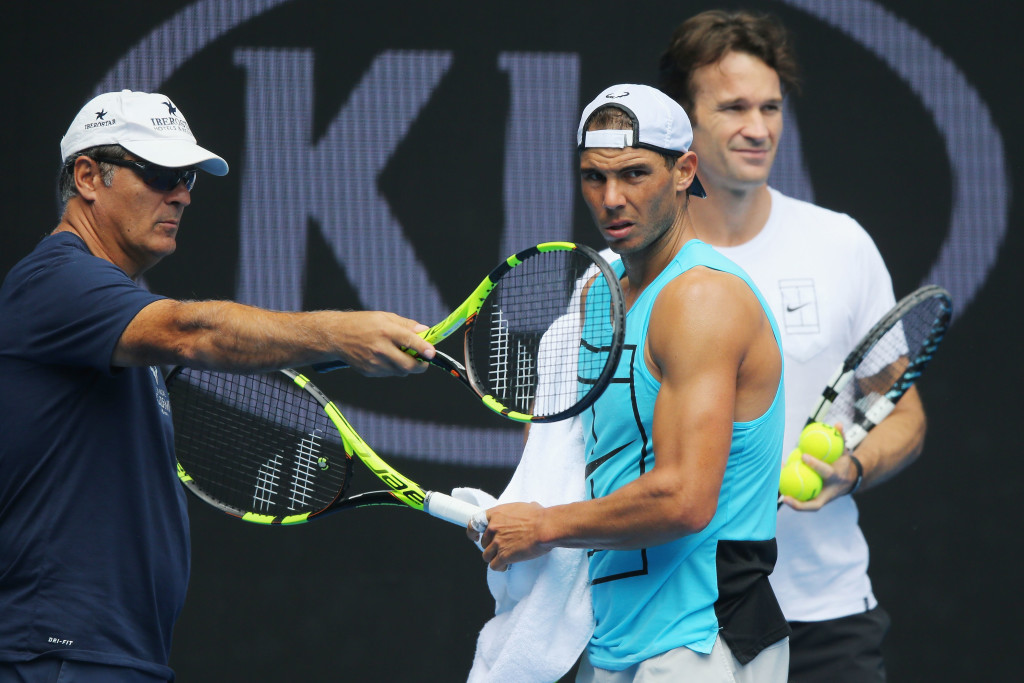
It has been three years since Rafa has won a Grand Slam title, with his last success coming at the 2014 French Open. Toni acknowledges that this drought makes things a bit different for them in their pursuit of a 10th crown here.
“For this yes, maybe. A little different, because in the last two years, Rafael hasn’t won a Grand Slam. But I know that every good player, McEnroe, Connors, I dunno… Bjorn Borg… there’s a moment when they couldn’t win another Grand Slam,” explained the 56-year-old.
“I don’t think about that too much. Now we’re here. Rafael I think is one of the favourites of this tournament – one of them. That’s good. I hope that Rafael can play very good these two weeks and if he can win this tournament it would be very special and very good but just like any year.”
Rafa’s road back to what appears to be his top form has been a long and winding one over the past three years.
“He had many problems, in his knees, his wrist, then he had a problem in his mind,” is how Toni describes it.
While fixing injuries is more about science, facts, rehab, and recovery, fixing a mental problem is far more complicated.
How did they manage to put Rafa’s mental issues behind him?
“I remember last year when he decided to stop, we had a meeting in the academy. He said ‘we have to talk’. I said ‘good, what do you have to do for next year?’” says Toni.
“First he told me ‘until my wrist is better, I won’t come back’.
“‘Okay, then what do we have to do next year? We have to recover your forehand, you have to play your forehand harder, you have to improve your serve. You have to change because life has changed and the game gets faster and faster every year’.
“Then I said ‘you have to change your face. You have to be competitive every tournament. It’s the same if you have problems or not. If you can make this, then you have no reason not to be again at the top, but you have to make these changes. It’s your problem, you have to make these changes or not, do what you want’.
“And I think he has changed all of these things and for these reasons he’s again a very good player.”
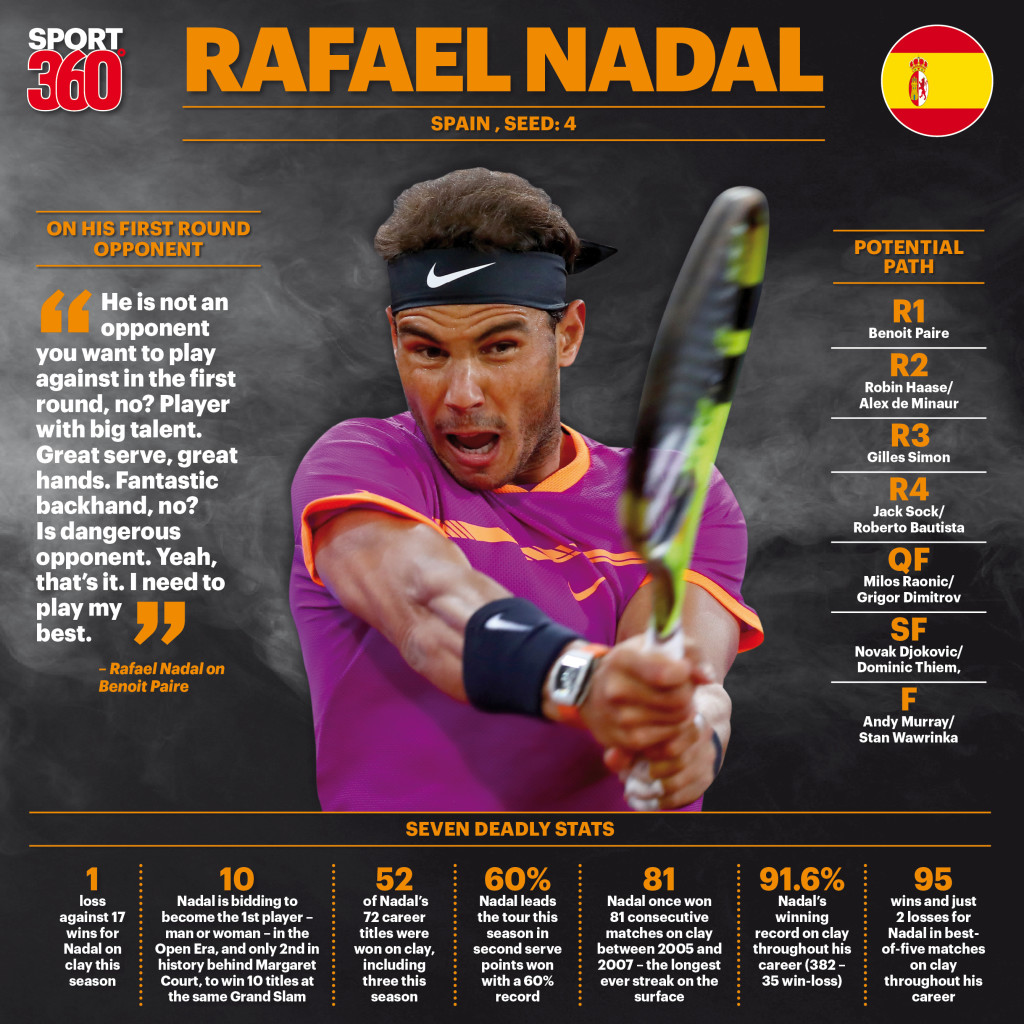
Toni says he always believed that once Rafa recovered his mental strength, he would be able to return to the top of the game.
The 30-year-old – 31 next week – is currently No1 in the Race to London and No4 in the world rankings. He has won Monte Carlo, Barcelona, and Madrid in recent weeks, and reached the Australian Open final last January.
He ended his seven-match losing streak to Djokovic in Madrid earlier this month, which surely must have been a psychological win more than anything else.
“To beat Djokovic is always very important but at the end, the most important thing is to win the tournaments,” insists Toni. “I remember in 2011 Roger Federer beat Djokovic in the semi-finals. But in the end Rafael won Roland Garros.
“For us it’s good because it’s not the same to beat the No1 or one of the best players as it is to beat the No100. And for us to beat Djokovic is always important, but the most important thing is to win the tournament.”
Besides his mental strength, Rafa’s legendary forehand that had tortured the likes of Federer for years often looked like it had lost its punch in recent seasons. Does Toni feel his nephew’s forehand is back to where it used to be?
“Completely? I never know. But I think his forehand is so much better,” he says. “The problem that we had before is that he used to play his forehand when he was young, when he started with his forehand, normally the point is finished, he starts with his forehand, one, two, three, four and the game was finished. And that was our strategy.
“But last year, or two years ago, he started with his forehand and then he loses the initiative, that was our problem. I thought we have to change this, the first thing. If not, then it’s difficult to be in the top, top.”
The changes in strategy have worked and Rafa is back to where he wants to be – a real contender for all the big titles.
Since Carlos Moya joined Team Nadal at the start of this season, Rafa has had three coaches in his camp – Toni, Moya and Francis Roig. Toni says his decision to stop coaching his nephew next season came when he saw how well Moya and Rafa were working together.
But is he not worried about how Rafa will compete without his help next year?
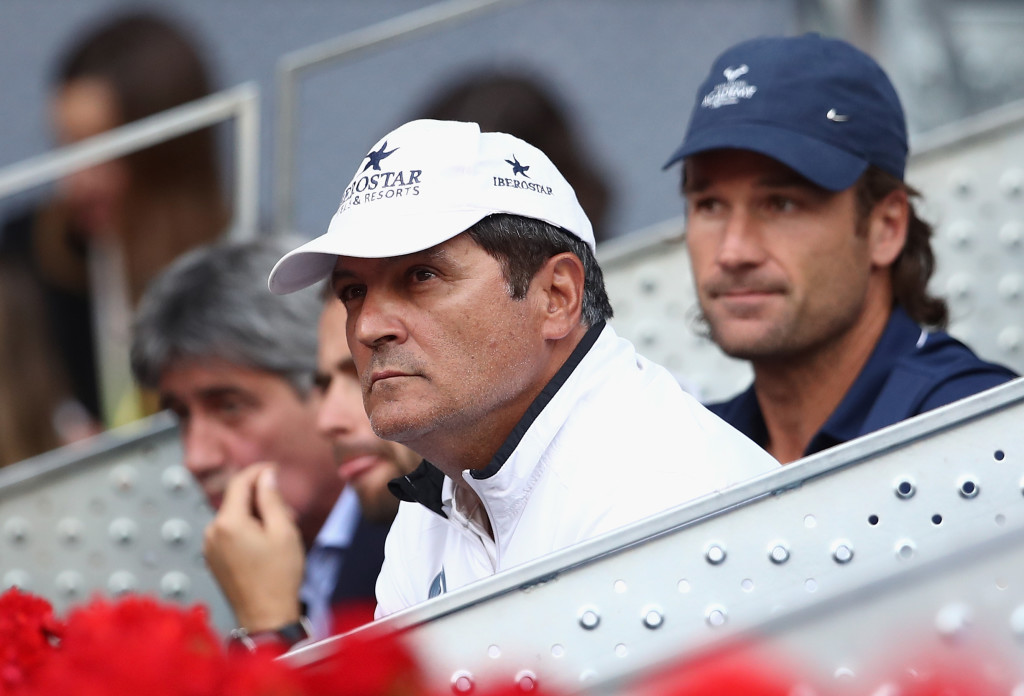
“How can he play without me? Exactly the same. I am sure,” insists Toni.
“The only thing I think he can be so much better because when he does something wrong, no one will say anything, that’s so much better for him,” he added with a laugh.
“I know for example, one day in Monte Carlo this year, we practiced and the guy who practiced with Rafael was playing really bad. We had to practice with him for two hours, and Carlos Moya told Rafael ‘it’s better to finish with this guy because he’s making a bad practice day for you’. And Rafael said ‘yes, it’s better’. So I said ‘the fault is not only for our partner, it’s for you too, because you made a bad practice day’. And that’s not what happened.
“In the next days when I’m not here, maybe the problem is always the sparring not Rafael. What is better? I don’t know. Maybe it’s better to say nothing,” he concluded with a chuckle.
Toni has a reputation of being strict with Rafa, and he was outlined in his nephew’s autobiography as someone who has been hard on him through most of his career.
In Toni’s eyes, it is more tough love than anything else.
“I am never so strict. I’m not strict. I am hard with my words only, because I think that’s the good thing for him, nothing else,” he explains. “I’m never hard with someone who can’t handle these hard things.
“Never have I been hard with someone I don’t love. I am hard with my kids because I love them so much. That’s the problem today, you want to be a friend of your kids and to say always good things, I don’t like to do that.”
Toni has no doubt left a lasting influence on Rafa, but he makes sure to remind us that it is his nephew that has special qualities that have allowed him to become a champion.
“What is talent? Talent is the capacity of work. Talent is intelligence, talent is the capacity to win matches when you play bad, and to think about your game and changing something. I think Rafael has more talent than Moya or Ferrero for this reason he has won more,” says Toni.
“But I think Rafael is more demanding of himself. He wanted it more because working with me was not easy, it was never enough. But I think in the end it was good for him.”
So if Rafa will survive just fine without Toni, will Toni be able to stay away from the tour? Won’t he at least miss the adrenaline, or will he join Rafa at some tournaments next year?
“No I won’t miss it,” he laughs.
“I don’t know, maybe if he paid the ticket, maybe I go, if not, I’m not rich enough,” he joked. “It depends, if he asks me ‘could you come here?’ Okay, I can come. But I don’t think he will need me.”